- Home
- Jeannie Wycherley
The Ghosts of Wonky Inn: Wonky Inn Book 2 Page 12
The Ghosts of Wonky Inn: Wonky Inn Book 2 Read online
Page 12
“And when you were ‘getting around’, what exactly were you doing?” I asked, and Arthur ducked his head once more, shifty in the extreme.
“Bit o’this, bit o’that. You know.”
“Poaching?” Perdita guessed.
“A man’s gotta eat.”
“That was a hanging offence,” I said, not meaning to judge, but thinking of the poor wretches I had come across in the Tower over the previous few days.
“Only if you got yourself caught,” Arthur glared at me. I could see he was suspicious of my motives once more.
“I’m glad you never did.” I hurriedly tried to smooth things over. Arthur sniffed. “And what about Luppitt?” I asked, “presumably he wasn’t a poacher? Was he?”
“Naaaaaaaaaaah!” Arthur laughed for an age, low and raspy, cackling like a drain until he finished up wheezing. “He belonged to this band of wandering minstrels and players. They used to perform all over. I’d see them in a few places from time to time, especially market towns and the like. I tended to stay in the woods, out of the way of folk, where I wouldn’t be seen, like. But these minstrels, they needed to be where they could be seen and heard, so they could make money. They were right in the thick of it. Always.” Arthur twisted his hat in his hands. “I never really had much to do with them except one winter, a bad winter—my last one—when I was really down on my luck, and this one player—he had a lute he did—he bought me a pie and a draught of ale.”
“That was kind,” I said.
“It was. He was the leader of them I think.”
“Can you remember his name?” I asked.
Arthur shook his head, his eyes cunning. “Nah. But as a group, they was known as the Devonshire Fellows. A playing company we called ‘em.”
“Did this playing company ever play here at the inn?” I asked and Arthur shook his head.
“They may have done, but I never saw them. This place wasn’t well established back then. The village here was just a few houses, but the forest? That was magnificent. It stretched on and on. Plenty of game. One of my favourites.”
“Thanks for the information,” I said.
“You’re welcome, ladies,” he replied and leered a little at Perdita. Chi growled at him.
“Remember, Arthur, you’re welcome at the inn any time.”
“That’s kind of you, Miss,” Arthur said, placing his hat firmly on his head, “but I lived my life outdoors and I died outdoors, so I guess this is where I’ll stay.”
I smiled. It seemed reasonable. “Well say hello the next time you’re passing,” I replied and led Perdita back to the inn.
“We need to get to Durscombe then,” I said doubtfully.
“It doesn’t appear to be far away.” Perdita peered down at her number map.
“It’s not. As the crow flies. But there is no public transport that will get us there. We’ll have to hire a taxi.”
“Let’s drive,” Perdita said.
“I don’t have a car.”
“There’s a van parked at the side of the inn,” Perdita pointed out.
“Oh that.”
“It looks as though it’s in decent enough condition.”
“It goes,” I said. “Or it did, a few weeks ago.”
“There we are then.”
I shook my head. “I don’t have a license. Not a full one.”
Perdita reached for her handbag and pulled out her purse. Riffling though it she found a small credit card sized photo ID. “Well I do.”
I perked up. “That’s great. You’re happy to drive it?”
“Oh I’m not going to drive it.” She pursed her lips prissily, as though she wouldn’t be seen dead in charge of such a scruffy vehicle. “The law says that a provisional licence holder can drive as long as a full licence holder is in the car with them.”
My mouth dropped open. “You want me to drive? I can’t. I haven’t been on the road for years.”
“You said you moved it a few weeks ago.”
“Around the corner!”
“Good enough.” Perdita smiled. “Chi and I will grab our jackets.”
Talk about a baptism by fire.
My heart was in my mouth. Starting the van and getting it into second gear was the hardest thing. Oh, and remembering to put it back into first when I slowed to a stop at the bottom of the drive to check for traffic.
Fortunately for me, the lanes were quiet, which gave me a little time to gain in confidence and think, ‘yes I can do this’. Until I met a car coming the other way and went into instant panic mode. The lanes were narrow and the passing places were few. I found myself in the hedge a few times. Perdita with Chi burrowed into her chest, hid her eyes.
“You know you could drive instead of me,” I yelped, but Perdita merely waved me forwards and held onto the little dog for dear life, cringing every time I ran a little too close to something sharp, pointy or hard at the side of the lane.
“Oh well,” I said, after one particularly scratchy encounter with some overgrown bramble. “Not my van, not my problem.”
In some ways, I’d struck upon the perfect revenge. As the roads widened and we pootled along at 28 mph in a 40 zone, heading for the coastal road, I laughed with delight, struck by the humour of the situation. I’d probably end up destroying Jed’s van during this outing and there wasn’t a thing he could do about it.
Well, wherever he was, he didn’t need it anymore, did he?
It was easier once we made it onto a decent road. Perdita sat quietly alongside me, humming to Chi and sporadically watching things that nobody else could see. On one or two occasions she drew her breath in sharply when I steered too close to the kerb or wandered over the central white line—when the road was wide enough to have one of those—but mostly she kept her thoughts to herself. Chi yelped too, when I hit a kerb at one stage, but my performance improved along the route, and I began to remember the rhythm of driving, the way the engine purred, recalling when to change up and when to change down. After fifteen minutes or so of constant slowing and speeding up, I even began to get the hang of shifting the gears, and the vehicle didn’t judder and jump so much.
We arrived into Durscombe just after six. A few people walked along the prom, watching the light on the cliffs as the sun began to set. The sea was tranquil, encroaching on the pebbled land calmly with a gentle shushing sound. The peaceful scene set the tone for the entire town. Durscombe appeared sleepy. A place where nothing bad could ever happen.
The car parks in town were largely empty, which meant I wouldn’t have an issue trying to insert the van between two other cars in a narrow parking space. I pulled up and as Perdita, Chi and I exited, I admired the job I’d done. Not too bad at all.
With relief, I hauled myself out if the van and held onto the door, taking deep breaths of sea air as Perdita consulted her map, and my knees stopped shaking. “Not far at all,” she said and led me down a narrow alley, where a thatched building was tucked away behind the car park. It had a pretty beer garden that opened out at the front, overlooking the prom and the beach beyond.
“The Blue Bell Inn,” I read the pub sign swinging above the entrance, “purveyor of fine ales, spirits and good food since 1492. That’s a good age. It must have been a fisherman’s pub I suppose.”
“Plenty of activity in here,” Perdita said as I followed her in to the dark interior, and I knew she meant of the ghost kind. The blackened wood and low ceilings, combined with the whitewashed walls, reminded me of Whittle Inn. Brasses had been nailed to the wooden beams, and pewter tankards hung at the bar. That was the look I intended to emulate. Traditional. Cosy. Very ‘ye-olde-worlde’ charm.
“Good evening ladies,” boomed a rotund gentleman at the bar. “What can I get for you?”
I glanced at Perdita. “I’ll get these. What would you like?” She opted for a Blood on the Streets and I grimaced inwardly as the bartender created the monstrosity from whisky, dry orange Curacao, soda water and grenadine on crushed ice. As tempted as I w
as to request a double brandy to calm my nerves after my first drive out in years, I figured I’d play it safe and ordered a fruit juice instead.
After I’d paid, I picked the drinks up and went in search of Perdita. The Blue Bell was a warren of rooms, some large like the front bar and some smaller, reminding me of The Nook and The Snug in my own inn. I found her in the largest backroom, where a fire burned in the grate despite the clement weather. One other couple were ensconced at a table here, the woman studying her phone, the man reading a newspaper. They ignored us as we slipped onto a wooden bench against the back wall, Chi slinking between Perdita’s feet and settling there.
“Look,” she said, but I’d already spotted the ghost lights she indicated. There were five of them, all roughly the same size, but slightly different colours. I set Perdita’s drink down and then with a nod from her, quickly acknowledged the lights, and called the spirits to me.
Bingo!
The spirits that appeared in front of us wore clothes reminiscent of Luppitt’s garb, with the enormous ruffled collar, and the material of the jackets slashed to show the garment underneath, skin tight trousers and wooden soled ankle boots. Two of the musicians played fiddles, one a lute and one a recorder. The other played a variety of percussive devices which appeared to be home made.
As they became less translucent I found I could hear the music, light and happy, with a beat you could tap your foot along to. The musicians had set up in the corner of the room to play to the gathered clientele, but of course the modern-day audience didn’t know they were there and couldn’t hear them.
As they came to the end of their current piece, Perdita and I applauded. The couple at the other table glanced across at us, slightly bewildered by our sudden activity. I smiled at them but otherwise paid them no mind.
The musicians looked our way and bowed, so I beckoned them over. Only one came, the others started up another cheerful tune without him. This man, the lute player, appeared to be slightly older than the others, silvery at the hairline, and slightly crinkled around the eyes and jowls. He was a cheerful fellow with a ready smile.
“Pleased to meet you,” I said. “I’m Alfhild Daemonne and this is Perdita Pugh. We’d like a word with you, if that’s alright.”
The man indicated the band behind him, “We only get paid while we’re playing,” he explained.
“I promise, I won’t take up too much of your time.”
He nodded and took a seat. Out of the corner of my eye I spotted the other couple glancing over at me and watching me as I spoke to apparently thin air.
“I’m Robert Wait, a member of the Devonshire Fellows. Players, musicians, poets and singers. At your service, dear ladies. Now, how may I be of assistance?”
“Does the name Luppitt Smeatharpe mean anything to you?” I asked, fully prepared to hear him say no. Until now, all the roads I had travelled had led me precisely nowhere. I couldn’t quite believe my ears when his eyebrows shot up and he gaped at me in surprise.
“Dear Luppitt? Why yes! Yes! You know of his whereabouts?”
“I do,” I said, slightly cagey, aware as always that I needed to protect Luppitt for his own good.
Robert stood and waved at the other musicians and they observed him with confusion. Gradually, one by one, they all stopped playing until only the recorder player, with his eyes closed and oblivious of anything going on around him, played on, the notes carrying sweetly in the evening air.
“Fellows!” Robert called, “this lady claims to know Luppitt and his location. What think ye?” The fiddle player slapped the recorder player on the arm and the musicians exchanged glances.
The fraction of a moment’s silence was shattered by the fiddler’s jubilant shriek. “Haha!” he yelled across the room at us. “At last!”
The percussionist, a small balding man, dropped his instruments with a loud clatter and bounded over to our table. His upturned face shone with joy and he clasped his hands together in excitement. “We’ve found him! We’ve found him! You have no idea. We searched long and hard all these years, knowing he was out there somewhere. Can you take us to him? Please? Will you?”
If the journey into Durscombe had been fraught, it paled in comparison to the journey home. Following introductions—Robert’s brother William was the long-haired fiddle player, Napier Harrow the percussionist, John Bond the second fiddle, and Stephen Arcott playing the recorder among other wind instruments—I led everyone to the van. Perdita sat in the front alongside me, this time hanging onto the door with Chi curled in her lap, and the wandering spirit minstrels took their places among Jed’s tools in the back. Motorised locomotion was a novelty to them, as it was in some regards for me, and I’m pretty sure if they hadn’t already been translucent, the minstrels would have been as pale as ghosts.
The lanes were bendy, winding around the steep hills, coiling and uncoiling like a snake. I tried to drive smoothly but it had grown dark while we’d been in The Blue Bell Inn and every oncoming vehicle blinded me into a full stop. Cue plenty of stalling and grinding through the gears. I drove with a churning stomach, cursing the fruit juice inside me, and vowing never to sit in a driver’s seat again in my life.
The thirteen miles took forty minutes, but finally, and with a huge amount of relief from all parties, the van rolled onto the gravel drive and I parked up alongside the inn. I twisted the ignition off with force, but resisted the urge to throw the van’s keys deep into the undergrowth, never to be found again.
We piled out, all of us looking a little green around the gills, my limbs trembling. But this was my inn and I was in charge and I needed to appear confident. I rolled my shoulders back and forced myself to look calm.
Ushering everyone inside, I switched on a few lights in the bar. The plastering had been completed but while it went through the process of setting, this meant the room felt cold. I couldn’t light a fire in here while the paint was drying so needed somewhere else to take the musicians. Perdita and Chi rushed away in the direction of The Nook or the kitchen, and I decided the rest of us would go up to my rooms.
As if by magic Florence appeared and deftly lit the fire in my room. “Would you like anything else?” she asked.
“Brandy,” I said, still in recovery from the journey. “Make it a large one, please.”
The musicians huddled together as a group, until I bid them make themselves comfortable. “Welcome to Whittle Inn,” I told them. “You’re very welcome here, any time. Have you been here before?”
The musicians conferred between themselves and Robert, who appeared to be the natural leader shook his head. “No, my lady. We knew of it, and I think we would have played here eventually had we been welcome, and had events not transpired the way they eventually did.”
Napier, the small balding percussionist shook his head sadly. “The loss of Luppitt was a terrible blow to the Devonshire Fellows. He was our star, our main attraction.”
“And our brother,” William the long-haired fiddle player added, and everyone nodded in agreement.
“He’s here?” Robert asked.
“Yes.”
Florence appeared with my brandy and I knocked it back, grimacing as it burned its way down my throat. “Would you mind bringing the bottle?” I asked her, and she raised her eyebrows but disappeared again.
“He is here,” I continued, “but he’s suffering severe trauma. Someone, somewhere has it in for him, and…”
“They keep killing him,” Robert finished for me.
I did a double take. “How do you know that?”
“We are a travelling band, a fraternity of musicians. We vowed to stay together even after death. One by one we left life behind but we all met up to play again, as the Devonshire Fellows, brothers for all eternity.”
“We witnessed his death, over and over, until one day he didn’t return,” Napier filled in, his voice full of horror.
“Wait,” I instructed, my mind a maelstrom of emotions. Here we were at last, so close to the truth
. “I need Luppitt to hear this whole story. I’ll have to entice him out of his hiding place. He’s been deeply distressed, and he trusts no-one. His memory has been affected as well—by the events either in his lifetime or after it.”
The musicians looked solemn. “All I know is that he’s a heartbroken ghost in need of some love. You can help him,” I told them. “Let me go and get him.” I stood to leave, but as I opened the door, I swivelled back to them. “Please, will you play? Play loudly and merrily as you were doing when Perdita and I found you in the Blue Bell Inn, and I will see if I can coax him out of his safe place.”
Robert nodded, and the fellows set up their instruments. I walked down the corridor listening to the fiddle sawing through a few scales as William tuned it, and then the inn bounced with a new energy as the group launched into a spirited Elizabethan dance, Napier’s drum keeping them in time.
As I opened the bedroom door where Luppitt remained in hiding, I glimpsed numerous spirits appearing around me, oozing out of the walls, and slipping through the other bedroom doors on this floor, all heading for my suite of rooms, intent on a free concert. Zephaniah, sprawled on the bed in Luppitt’s room, evidently on guard duty, jumped up as I entered.
I eased the wardrobe door open and gazed inside. Luppitt peered up at me from his scrunched-up crouched position, as always, his eyes full of tears. But this time he cocked his head, like a sweet puppy, when he heard the music for the first time.
“I have a surprise for you, Luppitt,” I said, keeping my voice low and gentle. “Won’t you come and see?”
“Is it safe?” he whispered.
“I can’t lie,” I replied. “I can’t say for sure that you’ll be entirely safe. I certainly hope so. But believe me, we’re all here with you.” I held out my hand, wishing I could physically take his, and watched him as he uncurled himself and slowly exited the wardrobe. He stood beside Zephaniah, a foot shorter than the tall Great War ghost, both of them listening to the music with rapt attention.
“Come on,” I said. “Follow me.” We joined the queue of spirits waiting to get into my rooms at the end of the corridor, then pushed through them—easier for me than Luppitt and Zephaniah.

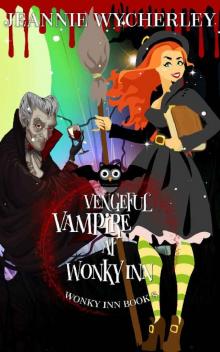 Vengeful Vampire at Wonky Inn: Wonky Inn Book 8
Vengeful Vampire at Wonky Inn: Wonky Inn Book 8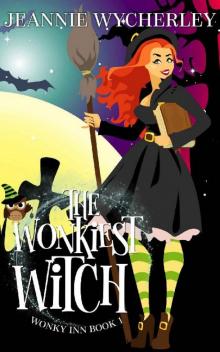 The Wonkiest Witch
The Wonkiest Witch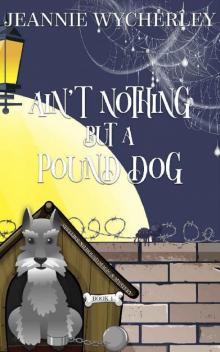 Ain't Nothing but a Pound Dog
Ain't Nothing but a Pound Dog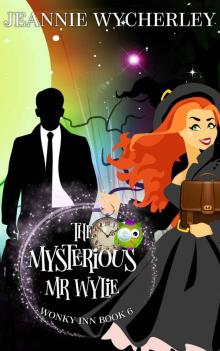 The Mysterious Mr Wylie: Wonky Inn Book 6
The Mysterious Mr Wylie: Wonky Inn Book 6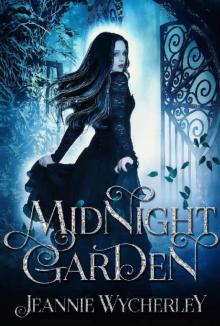 Midnight Garden
Midnight Garden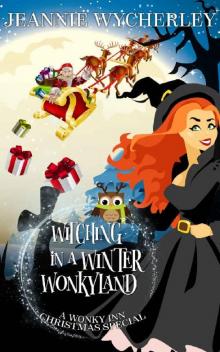 Witching in a Winter Wonkyland: A Wonky Inn Christmas Cozy Mystery
Witching in a Winter Wonkyland: A Wonky Inn Christmas Cozy Mystery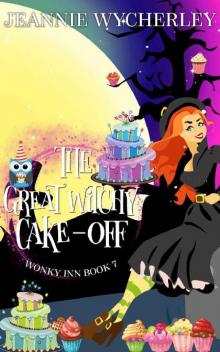 The Great Witchy Cake-Off
The Great Witchy Cake-Off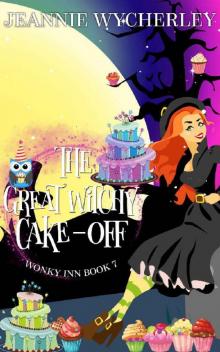 The Great Witchy Cake Off: Wonky Inn Book 7
The Great Witchy Cake Off: Wonky Inn Book 7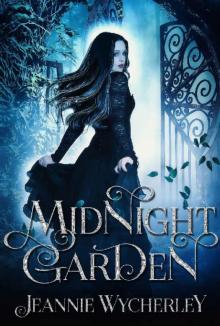 Midnight Garden (The Extra Ordinary World Novella Series Book 1)
Midnight Garden (The Extra Ordinary World Novella Series Book 1)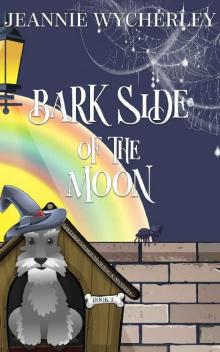 Bark Side of the Moon: A Paranormal Animal Cozy Mystery (Spellbound Hound Magic and Mystery Book 3)
Bark Side of the Moon: A Paranormal Animal Cozy Mystery (Spellbound Hound Magic and Mystery Book 3)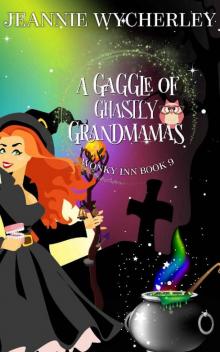 A Gaggle of Ghastly Grandmamas: Wonky Inn Book 9
A Gaggle of Ghastly Grandmamas: Wonky Inn Book 9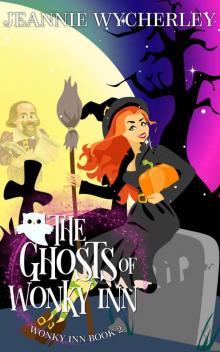 The Ghosts of Wonky Inn: Wonky Inn Book 2
The Ghosts of Wonky Inn: Wonky Inn Book 2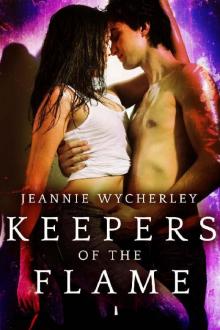 Keepers of the Flame: A love story
Keepers of the Flame: A love story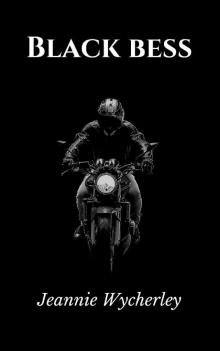 Black Bess
Black Bess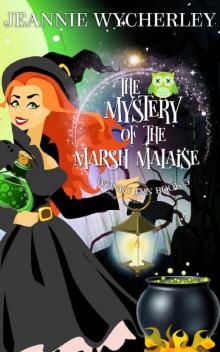 The Mystery of the Marsh Malaise: Wonky Inn Book 5
The Mystery of the Marsh Malaise: Wonky Inn Book 5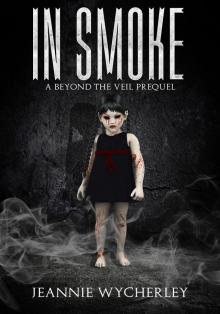 In Smoke eBook ready
In Smoke eBook ready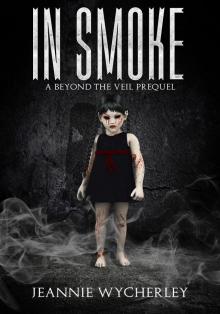 In Smoke
In Smoke